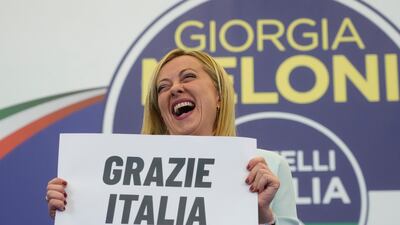When I was a university student, Austria's far-right leader Jorg Haider became a partner in the coalition government. His party’s power was such that it would have been appropriate that Haider became chancellor, but his controversial nature meant he stepped aside for a less powerful politician. It wasn’t enough to save Austria from mass condemnation; the heads of government of all other EU members ceased co-operation with the Austrian government in protest at any coalition that engaged with far-right extremists. That feels like a lifetime ago, alas. Italy’s latest election reminds us how far we have come, and not in a good way.
The EU's refusal to deal with Haider at the time was rooted in a post-1945, continent-wide sentiment that the far right was a poison that had brought Europe into disaster, and thus no part of the political spectrum should engage with it positively every again. That sense of alarm was brought about by the actions of two political forces in the first half of the 20th century: the Nazis of Germany, who led the perpetration of the Holocaust and many other massacres, and the fascists of Italy, who created the first concentration camps – not in Europe, but in Libya, as Italy committed atrocities in that occupied land.

It is why the EU responded so vigorously against Austria, and with good reason. European politicians and European peoples remembered where the far right and other types of political extremism that had been so popular on the continent had taken them – to disaster. But before they did so, these types of extremisms devastated minorities – particularly, ethnic and religious minorities.
It is important to note that it was not last week – when Giorgia Meloni, Italy’s prime minister-in-waiting, rose to power – that Europe seemed to forget the consequences of that sordid past. It has been happening for much longer than that.
Slowly, but surely, the far right has been growing in influence on the continent, and in the West more generally, within a generation of the end of the Second World War. Some of them tried to start new political parties from the get-go, while others opted for a more gradualist strategy, by joining trends within existing, powerful right-wing and centre-right parties, such as the Republican Party in the US. You had the likes of Jean-Marie Le Pen’s National Front in France (since renamed the National Rally by his daughter, Marine); the Alternative for Germany; the Freedom Party of the late Haider; and the Hungarian Jobbik party. They didn’t stay on the sidelines of western politics for long – and they didn’t face opposition from the more mainstream parties in the same way that Haider did for long.
Hungarian Prime Minister Viktor Orban is one of the most pre-eminent examples of this "tolerating the most intolerant" trend. In a 2018 address, Mr Orban said: "We must state that we do not want to be diverse and do not want to be mixed: we do not want our own colour, traditions and national culture to be mixed with those of others. We do not want this. We do not want that at all. We do not want to be a diverse country."
That is the kind of sentiment that would have made Haider seem tame in comparison, but Mr Orban felt completely empowered to be public about his sentiments. His party in the European Parliament is not alone – it stands alongside the likes of the National Rally, the Polish Law and Justice, the Spanish Vox, the Italian Northern League, the Freedom Party of Austria, Belgium's Vlaams Belang, the Danish People's Party, and several others. As Ms Meloni takes charge next month, shortly after the 100th anniversary of the infamous March on Rome that led to Benito Mussolini’s fascist rule, it seems Europeans are facing the consequences of taking these kinds of tendencies so lightly.

It is a worrying development, one that seems Europe has not learnt sufficient lessons about.
As this latest phase of the mainstreaming of the far right took place, the European Commission, in the words of analyst Daniel Hegedus of the German Marshall Fund, “clearly subordinated the protection of EU values like democracy and rule of law to short-sighted institutional and party-political interests”.
Mr Hegedus assesses that the EU is finally showing signs of changing – but certainly, it is not doing so fast enough. The EU has withheld funds from both the Poles and the Hungarians as a result of their drift towards political extremism, but within many EU states, the political spectrum has been unable, unwilling, or both, to face down the troubling shift.
That shift is transnational. These movements ally with themselves in Europe, but also with far-right movements in the US, and have clearly benefited tremendously from support from Moscow. As Europe, and the world, slowly awakens from its slumber when it comes to the mainstreaming of the far right, it has to consider the wider consequences to its own national security, as these destructive forces take aim at the fundamental principles that underpin the likes of the EU. In the meantime, minorities will quite rightly look upon these events with a historical eye – and they won’t be optimistic.


